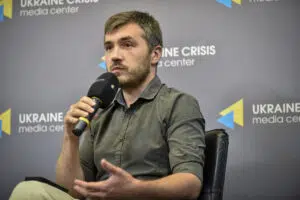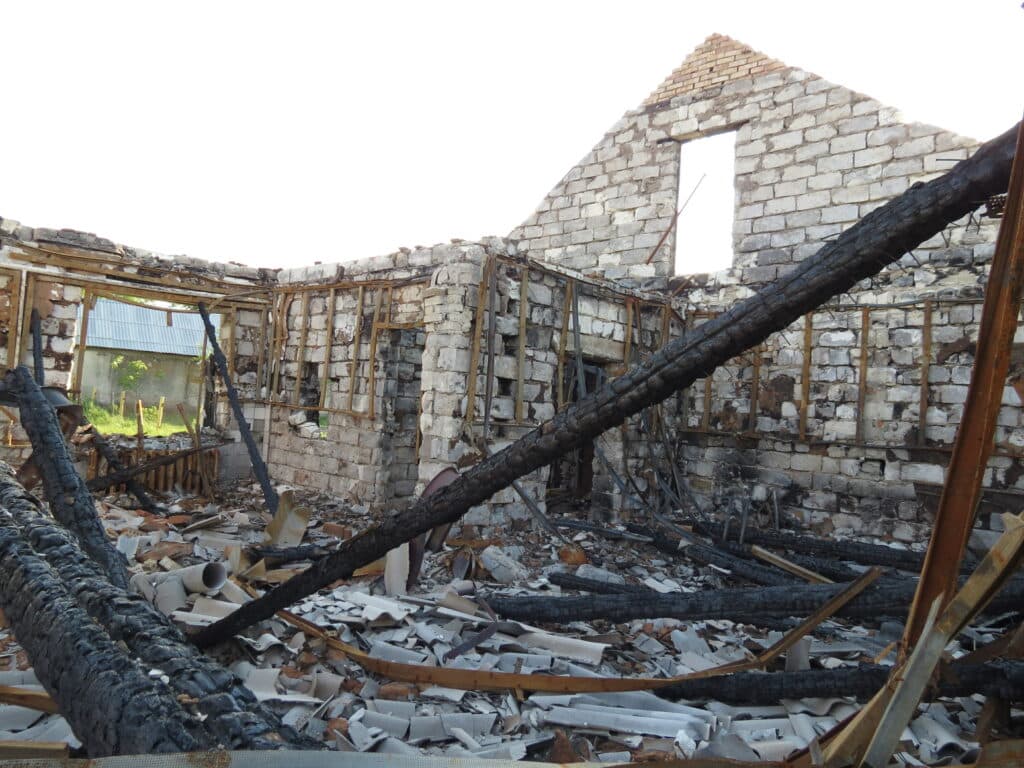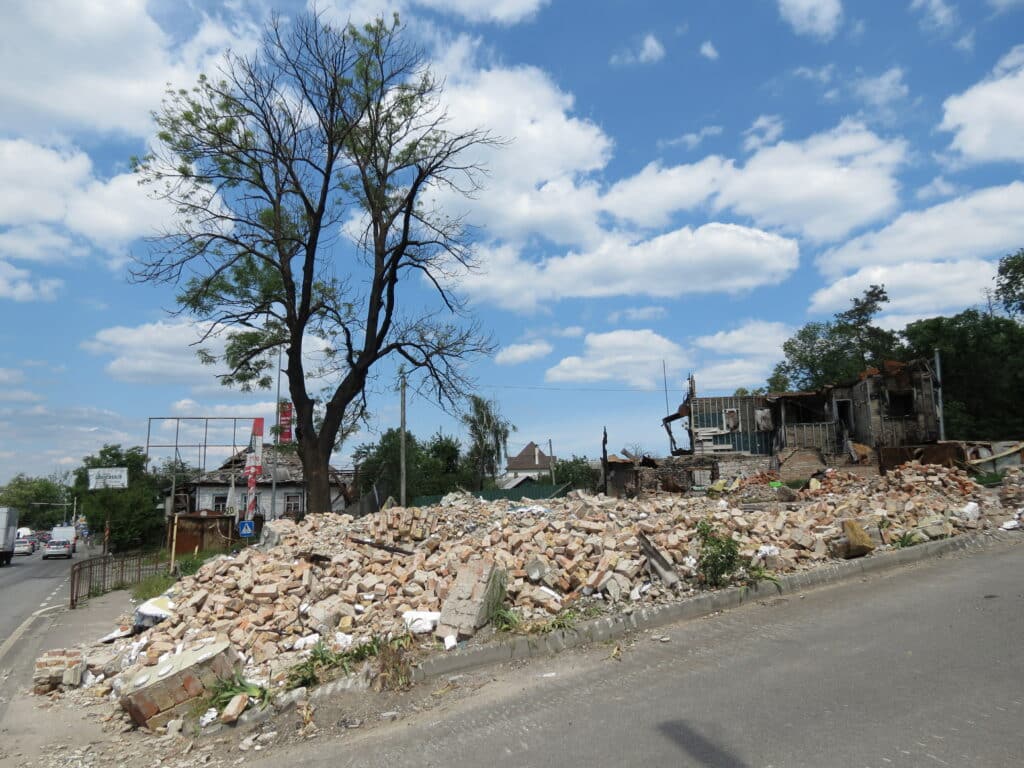Ruslan Khalikov is an expert in religious studies, a member of the Board of the Ukrainian Association of Researchers of Religion, and he works on a project to document the effects of the war on religious pluralism in Ukraine, either in occupied territories or in the rest of the country. He and his colleagues documented a huge number of destruction of religious sites and buildings since the beginning of the war. We had the opportunity to talk to him briefly and ask him a few questions:
1. Can you describe briefly your research project?

Our project “Religion on Fire: Documenting Russia’s War Crimes against Religious Communities in Ukraine” was launched as a response to Russia’s full scale invasion of Ukraine. In March 2022 our organization, Workshop for the Academic Study of Religions, initiated the project, and from the very beginning it was supported by the State Service of Ukraine for Ethnopolitics and Freedom of Conscience and the Congress of Ethnic Communities of Ukraine. Later, the project gained support from the International Center for Law and Religious Studies (USA).
This project aims to record and document the damage suffered by religious buildings as a result of military actions of the Russian army in Ukraine, as well as killing, wounding and abduction of religious leaders of various denominations. During the war, our team has a goal to collect data on war crimes committed by the Russian Federation in Ukraine against religious communities of various denominations. The materials we collect can be used in future studies of the war’s impact on the religious communities of Ukraine, in preparing reports for international organizations, as well as evidence to bring the aggressor to justice.

As by now, more than 240 religious buildings were affected by military actions, which we have registered in our database. About 140 of them are Christian Orthodox churches, monasteries, and most of them belong to the UOC (MP). Mosques, synagogues, halls of prayer, kingdom halls, ISKCON ashrams, buildings of other religious minorities are also suffering, and we register them also in the database. We also know about some fifteen cases of religious leaders murdered or killed by shelling, including military chaplains and civil volunteers from religious communities. Some local religious leaders have been abducted by Russian military forces, forced to leave their home and parish on the occupied territories.
2. What is the situation regarding religions in Ukraine during the ongoing war? In free Ukraine? In occupied territories?
The situation is very different, depending on the experience of believers in a particular area. Where the fighting and shelling are ongoing, or in places that were under a short-term occupation, we see an increase in cooperation between different religious organizations, even if before the invasion they treated each other as opponents. For example: between different Christian Orthodox churches, Orthodox and Protestants, Muslims and Christians. The main focus of cooperation is volunteering, humanitarian activities.
Congregations provide shelters to civilians during shelling, deliver humanitarian aid, supply army chaplains to military units (the law on chaplaincy has been fully adopted only this spring), organize blood donation, etc. In places where the fighting front is not so close, and where there is no daily and immediate threat to life, competition continues between religious organizations.
In the newly occupied territories, believers of a number of religious organizations, especially religious minorities, are expected to face restrictions in their practice. Denominations banned in Russia, such as Jehovah’s Witnesses, followers of Said Nursi, Hizb ut-Tahrir, will be also banned as Russian administrations strengthen there.
In the free territories, all religious organizations distance themselves as much as possible from ties with Russian co-believers. Even the Ukrainian Orthodox Church, which previously was in union with the Moscow Patriarchate, held a special Council on May 27 and deleted this connection from its charter.
On the contrary, in the occupied territories, several communities of this church are forced to go under the subordination of the Russian Orthodox Church. Although since 2014 until the current escalation, the communities in both Crimea and CADLR (Certain Areas of Donetsk and Luhansk Regions) were formally considered as parts of the UOC. Likewise, the Muslim communities of Donetsk and Lugansk regions in the occupied territories entered the sphere of influence of the Russian Council of Muftis and the Spiritual Assembly of Muslims of the Russian Federation, respectively.
3. Do you see an increase in religiously motivated crimes from the Russian part?
From the very beginning of the invasion, and even before it, Russian political and religious leaders, including President Vladimir Putin, Patriarch Kirill Gundyaev, Mufti Talgat Tadzhuddin, Pandito Khambo Lama Damba Ayusheev and others used the religious factor as one of the reasons for the invasion. They accused the Ukrainian side of violating the rights of the UOC, of imposing Western values, and urged to rid the population of Ukraine from “religious oppression”. At the same time, with its invasion, Russia is not only destroying the landscape of religious pluralism in Ukraine, but it also is literally destroying dozens of temples of the UOC (MP), depriving believers of the opportunity to implement their freedom of religion and beliefs. In this sense, there is no growth, the degree of hate is consistently high.
If we talk about the increase in the number of religiously motivated crimes, then we can talk about it, first of all, in the occupied territories, where religious pluralism is declining, minorities are losing the opportunity to freely practice their religion. But even priests of the UOC-MP who are disloyal to the Russian administrations risk ending up in prison, they are periodically called in for interrogations or even kidnapped for a while, they are threatened on social media. If Russia decides to officially annex the captured territories, we can expect that a number of religious communities there will fall under Russian legislation on extremism, as it happened in Crimea. So far, Russian administrations do not feel confident enough to devote much time to religious repressions.
4. Anything you’d like to add?
I’d like to emphasize the need for assistance to Ukrainian religious minorities, as they may not be able to recover on their own after the destruction of religious buildings and the collapse of communities during the war. This will preserve the high level of freedom of religion and beliefs, as well as pluralism that the Russian Federation is trying to destroy. Ukraine also needs help in documentation of the war crimes, because the number of war crimes in general already reaches hundreds of thousands, all investigative bodies work with cases, and civil society is also engaged in documentation, but we need both institutional and resource support from European countries. And last one, please don’t stop raising awareness about the war in Ukraine, including the destruction of religious buildings – nothing has stopped yet, war is ongoing, and only united Europe can help to finish it.







